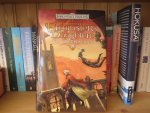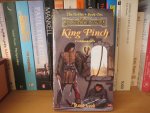#074 Elminster's Daughter by Ed Greenwood (Elminster 5)
Read 31/5/20 to 8/6/20

Book 5- and where to begin, well- by first off asking how is this book the conclusion to a series? But, I guess the series itself is tenuously linked- they're all about Elminster, and yet this seemed to me be more like the start of something- I'll explain as I go on.
There are two or three stories in here, and the links between them are... again, a little tenuous- I get that they overlap but there doesn't seem to be a whole lot of input from El (or Narnra) at times, again- let me try to explain.
The stories are-
1) Cormyr is about to enter civil war- or else a bunch of uppity nobles (and others- there's a Red Wizard in there, isn't there always) et al are looking to supplant the present ruling family. So, more or less straight after we get to meet Narnra (daughter of El) the rogue ends up in the middle of the secret meeting to overthrow the royal family- and that's great. Some good El action here, then however- after a fantastic city top chase through Marsember, she gets caught. The Harper hero, the chaser, is too cool for school- so, all is great so far. Then- squiggly lines.
2) Meantime Vangey has gone into hideaway, after the loss of Azoun (I presume, I've skipped ahead- timeline-wise reading this one). Anyway, the crazy mage is out to bind dragons into service of the realm- so, that's playing out in the background too.
3) Lastly there's Narnra's story, as she learns that El is her dad- as cruel and as heartless as he is, the daughters of El (as it turns out) are legion, but that's the finale. This story culminates, while the above two stories are tearing themselves apart, with a pool side father- daughter chat, which is great but... doesn't seem to do anything much but deflect from the climaxes happening elsewhere.
There's a brief moment when Vangey's would-be dragon guardians get to flame and blast Cormyreans of all banners, but other than that stories 1 and 2 don't really overlap- much. Likewise the input of Narnra doesn't much impact upon stores 1 and 2 either, although neither does El (again, much).
So, in my eyes- Narnra is great, but just an observer. El does is thing midway through the book- and it was the hardest part by far to slog through, later (by the pool with his daughter) he's a delight.
Can someone offer me a reasonable explanation as to why El seems to delight in blundering into the GOOD GUYS lair, suffering all manner of attacks and alarms, and never once just telling them who he is- he suffers the storm and then, right at the very end when the good guys are just about out of ideas, he tells them who he is and that he's playing for the home team.
Can someone just get him a laminated badge?
It's not like he's the most recognisable Wizard/person in the realms.
El sucks the phat one.
At times, there- I've said it.
Okay, back to the here and now- there are a few other odd moments to contend with- a pair of Marsembian/Marsemberian dodgy merchants that seem to follow the action- mainly so they can point at it (the action) and we can smirk at their various swoons and devices. They're okay but they seem to have been edited down to a nub, the pair start well- with plenty of page-time and then, they're gone.
There's a Sembian paladin (I'm guessing) that appears at Candlekeep, and then later appears at the climax to do good- by killing a bunch bad to the bone nobles. Why?
Is this the start of another story?
Likewise does Narnra get her story told elsewhere? Because if this is it, then she's been shafted.
So, in conclusion- I liked all three stories well enough, I liked El at the start and the end- but not in the middle. That said the three stories could have been shorter, and not presented as a whole, maybe. It seems stories 1 and 2 could hang together (better) if story 3 wasn't so shoe-horned in. It would have more or less all played out as is without Narnra, all we got to do was to see and hear, and meet her. Or did I miss something?
Read.
Just to say I'm going to give myself a year of this and then I'm going to slow down some more by reading 'real' books either between series, or else if it's a bad patch then between every FR novel. I gave myself ten years to get through this- let's say there are approx. 300 books to read, well- I'm 25% of the way there and we're still in the first year. So, making good time- I figure I may try to relax into it a little more. Maybe then El will be more of a delight.
Stay safe.
Cheers goonalan












